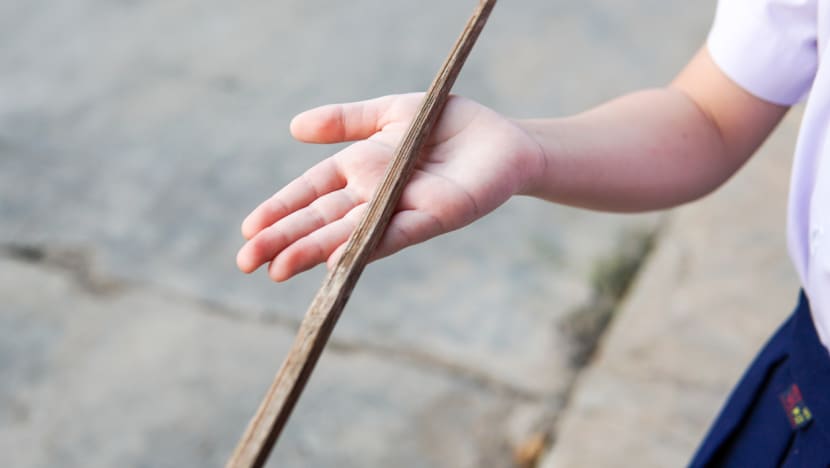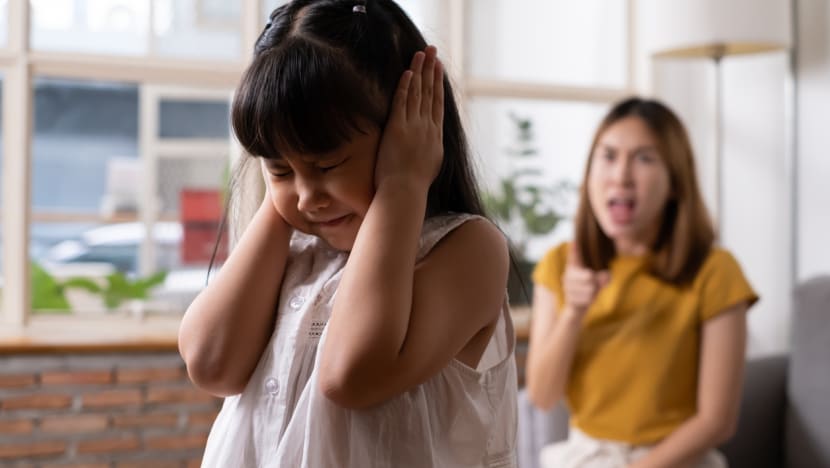Commentary: Singapore parents need to let go of the cane and guilt
International Spank Out Day on Apr 30 aims to bring global attention to ending the physical punishment of children, as well as promote positive parenting. Singapore Children’s Society CEO Ang Boon Min discusses how this means leaving behind our deeply rooted beliefs about physical discipline.

File photo. Despite the emergence of alternative perspectives on parenting, physical discipline such as spanking and caning remains a staple discipline tool. (Photo: iStock/piyawit ubonsatit)
SINGAPORE: Modern-day parenting demands copious amounts of caffeine, time and energy. Besides having to tackle an incessant list of to-dos, parents are faced with a deluge of information on how to raise and discipline our children. There’s no lack of well-meaning advice from friends, cautionary anecdotes from grandparents and relatives, and snappy parenting reels on social media.
Yet, despite the emergence of alternative perspectives on parenting, physical discipline such as spanking and caning remains a staple discipline tool in Singapore.
Nearly 45 per cent of the 747 parents surveyed in a joint study by Singapore Children’s Society and Yale-NUS College in 2021 said that they had used physical discipline at least once in the past year. Nearly 30 per cent said they used it regularly.
However, the study also showed that parents who felt that physical discipline was necessary faced a lot of internal conflict while they were using this method to punish their children. They described it as being an intensely negative experience and felt guilt and regret after. Many were very aware of its limitations and potential negative impacts too.
So, the broader question remains - if physical discipline causes this much emotional tension and discomfort, why are we still using it?
As we commemorate International Spank Out day on Apr 30, how can we move away from using physical discipline to correct our children’s behaviour?
“I WAS CANED AS A KID, AND I TURNED OUT FINE”
Our study found a persistent intergenerational link when it comes to the use of physical discipline. Even parents who disagreed with its use spoke about “subconsciously” defaulting to it out of “muscle memory”, because of their own childhood experiences.
It takes intention and effort to choose to parent differently. Besides having to reconcile with the hurt from our upbringing, we also need to leave behind deeply rooted personal and societal beliefs about physical discipline.
But what are some of its prevailing misconceptions and how should we overcome them?
You’ve heard the term “I grew up being caned and I turned out fine”.
In our study, young adult respondents we also spoke to who were physically disciplined as children grew up with poorer emotion regulation, self-esteem and parent-child relationships.
Sure, we may be able to function in our everyday lives, but if we look closer at our social-emotional selves, are we able to cope with negative emotions in healthy ways? Is our self-worth based on other people’s perception of us? Do we have a positive, thriving relationship with our parents? These are important markers that tell us whether physical discipline has impacted us, beyond what we project on the surface.
Another misconception is: “Physical discipline is ok, as long as I am calm and rational when I use it.”
That is what the parents in our study thought too – that it is alright to use physical discipline if parents are in control of their emotions. But ironically, they were often not.Instead, most of the parents reported feeling very angry or frustrated in the moment and physical discipline was typically used on impulse, as shown in the case of this parent:
“Usually it depends on my mood and my stress rather than what they did … If I’m really stressed out, that’s when I don’t really think and I react to the situation, so then I find myself physically punishing them.”
Is it then even possible to use physical discipline on children “judiciously”, or in a “measured” way? If parents were (actually) calm in the moment, might they also choose to discipline their children in a different, non-physical way?

FEAR OR RESPECT?
Another often heard phrase is: “When I speak to my child nicely, he doesn’t listen. Only when I threaten to use the cane, then he’ll pay attention to what I say.”
When parents whip out the cane or threaten to spank, they might gain immediate compliance from their children out of fear, but research has shown that they are not intrinsically motivated to want to do better.
If parents take the approach of connecting with them, validating their feelings, gaining their cooperation and helping them see the rationale of why they do certain things, children will be more likely to carry out tasks because they are genuinely willing to do so.
Parents may set out with the intention of wanting their children to learn right from wrong, but physical discipline, in fact, undermines parenting goals. Children cannot internalise moral values when they cannot see past their resentment towards being punished.
There are other means to help children learn, such as through setting natural or logical consequences. Both of which aid children in understanding how to problem solve for the future.
DOING BETTER WITH THE PARENTING KNOWLEDGE WE NOW HAVE
Our parents parented under different circumstances, and they (in most likelihood) did their best with the kind of knowledge they had in the past. Over the decades, however, research into child development and brain science have allowed us to gain alternative perspectives on how to parent our children better. This is why we must also aim to do better.
Brain science tells us that our “feelings brain”, the limbic system, which is responsible for emotions, is well and functioning from birth and matures when we reach adolescence. On the other hand, our "thinking brain", the prefrontal cortex, which is responsible for logical decision making and behavioural self-control, only fully matures when we reach our mid-twenties.
Oftentimes, children are unable to regulate their emotions or control their impulses, not because they do not want to, but because they cannot. Recognising this enables us to show empathy for their difficult behaviours and manage our expectations of what children can or cannot do.
The child who throws a massive tantrum because his parents do not want to get him another toy is likely doing so because he cannot cope with his overwhelming feelings of disappointment. The child who keeps hitting out at her younger sibling is probably feeling disconnected and cannot think of other ways to gain her parents’ attention.
Children need help in building skills to communicate their feelings in an appropriate way. They should not be physically disciplined because they lack these skills. In the thick of the moment, as they are riding out their intense feelings, the most loving (albeit hardest) thing we can do during these challenging times is to stay calm and hold space for them.
NOT A FREE PASS
Not using physical discipline does not mean parents are giving a free pass to their children’s misbehaviours. On the contrary, positive parenting involves setting clear boundaries around their behaviours, while acknowledging their feelings about these boundaries. Parents lead by being firm yet kind.
Society does not reflect it enough, but it is tough being a parent. We take our children’s behaviours as a report card of how well we are doing. Plus, it seems that every time we figure out how to work with our children at a particular stage, another developmental milestone comes along.
Along our parenting journey, and despite our best intentions, we will fumble and make mistakes. But no matter the discipline approach we started off with, we all want the best for our children. We can take heart that change is possible, as long as we continue to prioritise our relationship with them above all else.
Ang Boon Min is Chief Executive Officer of Singapore Children’s Society.





















